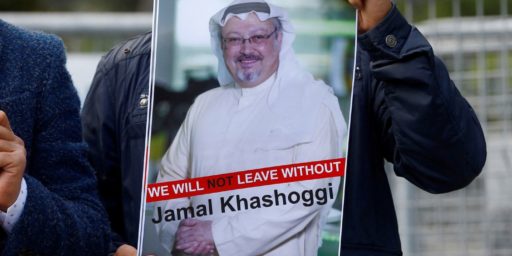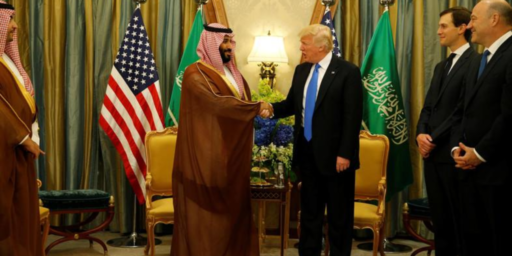Another Republican Resignation – He’s proud but tired of battling slavery
What do Belize, Saudi Arabia, Burma, North Korea, and Uzbekistan all have in common? They are among the dozen nations on the US State Department’s list of Tier 3 nations for human trafficking. Slavery, that is. Ambassador John Miller (a former Congressman from Seattle) , the head of the State Department’s Office to Monitor and Combat Trafficking in Persons (G/TIP) is resigning (Reg may be required) to join the faculty of George Washington University (AKA the University that Ate Foggy Bottom), where he will teach a course in human trafficking.
Warning: Some of the descriptions are disturbing, but I recommend you read it to see current “man’s inhumanity to man.”
He met her in a Starbucks in Riyadh, Saudi Arabia. While the story she told was gut-wrenching, it wasn’t unlike those he’d heard countless times over the past four years.
Nour Miyati, an Indonesian woman in her 20s, had come to Saudi Arabia to work as a domestic servant. But her dream of supporting her family back home turned into a nightmare. Her employers abused and tortured her. She lost fingers and toes to gangrene when the wounds from her beatings went untreated and festered. When she finally escaped and sought justice in a Saudi court, she was sentenced to 79 lashes.
“It was heart-rending,” John Miller said of his meeting with Miyati.
Miller, a former congressman from Seattle, has traveled the world as the head of the State Department’s office to monitor and combat human trafficking. But after visiting 50 countries since 2002, pleading his case with crown princes and prime ministers and meeting, by his count, more than 1,000 survivors of 21st-century slavery, Miller is moving on.
“It’s been rewarding and I think we have made a difference,” Miller said in an interview. “But I’m worn down, and after four years it is time for a change.”
Unlike some other recent Administration resignations, this one is not a political resignation, but it sounds like burnout.
Every year, an estimated 600,000 to 800,000 men, women and children are trafficked across international borders, according to the State Department. About 80 percent of them are women and girls. Up to half are minors.
Most of them are victims of sex trafficking, winding up as prostitutes in countries ranging from the Dominican Republic to the Netherlands to Japan. Others are forced to become beggars, child soldiers or camel jockeys. Still others are forced to work in sweatshops 20 hours a day or are trapped in involuntary servitude as construction or domestic workers.
After four years of listening to victims’ heart-rending stories, it takes a lot to shock Miller.
He recalled meeting an 11-year-old who worked in a Southeast Asia embroidery factory whose owner poured acid on her and shot her. He met a man in India who was an indentured servant at a brick mill because his grandfather had borrowed 20 or 30 rupees years ago and the family had been unable to repay the debt. In Amsterdam, he met a Czech woman who was forced into prostitution after being told she’d never see her 2-year-old daughter again if she didn’t cooperate.
“Intellectually you know this has been with us since the pharaohs,” Miller said. “But when you see it, when you meet with the survivors, it hits you — it’s human greed that leads to this type of abuse.”
There is much more at the links. Only the USA and Sweden have diplomatic offices on human trafficking. The dozen Tier 3 countries are:
-
Belize
Burma
Cuba
Iran
Laos
North Korea
Saudi Arabia
Sudan
Syria
Uzbekistan
Venezuela
Zimbabwe
My quick look is that these are either despotic (to include SA, which formally banned slavery in the 1960s), or countries that are barely nations (no internal control). The concept of human trafficking can often lead to gray areas, and the USA needs another strong Ambassador in this area.





Hm. ALL of the official Bush-Admin demon countries appear on the list. Iran and Venezuela especially stand out. Not a single nominal US ally appears. Not Saudi Arabia, not Colombia. Maybe it’s just a coincidence. Maybe it shows how deeply morality influences Bush Administration policy. Or maybe, just maybe, there’s a lot of playing politics involved in designating someone Tier 3.
Actually, Saudi Arabia is on the list, and James’ first extended quote dealt with SA.
What a great post for the day Dick Cheney arrives in SA…
For those interested in the scale of the problem, there’s a BBC website which gives an accessible summary. The UN says that the problem is growing, with an estimated 12.7 million victims worldwide.
And here’s the 2005 UNICEF list of nations where over 100 people are provably known to have been trafficked in the preceeding 12 months:
There are others that should be on the list, such as Iran and Burma, where hard proof can be more difficult to come by – but no nation sems to be guilt-free. Jim has the gist of it when he says that politics plays a huge part in assigning nations to arbitary “tiers”.
Regards, Cernig
The Bush Administration has so little credibility these days, that seeing this tiered list provokes an assumption that these are probably not the real problematical states. Is it really credible that the trafficking problem is greater in Venezuela, Iran and Syria than in, say Russia? Or Belarus? Or China?
Here’s the website page giving the complete list of “tiers” from the State Dept’s 2006 report.
I notice the US doesn’t rate itself despite the more than 50,000 people trafficked annually. Placement on a tier is “based more on the extent of government action to combat trafficking, rather than the size of the problem, important though that is.”
Of especial interest are the “Tier 2 watchlist” nations. These are nations that seem to be making efforts to improve but where-
a) The absolute number of victims of severe forms of trafficking is very significant or is significantly increasing;
b) There is a failure to provide evidence of increasing efforts to combat severe forms of trafficking in persons from the previous year, including increased investigations, prosecutions, and convictions of trafficking crimes, increased assistance to victims, and decreasing evidence of complicity in severe forms of trafficking by government officials; or
c) The determination that a country is making significant efforts to bring itself into compliance with minimum standards was based on commitments by the country to take additional future steps over the next year.
Plenty of U.S. allies there. However, if any were to slip down to Tier 3 then U.S. law could require the witholding of “non-humanitarian, non-trade-related assistance from the United States to that country.”
So…just listing the “Tier 3” nations could leave folks with some misleading notions – the list is quite possibly influenced by political considerations and a “Tier 3” designation says more about a lack of government enforcement than absolute numbers.
Regards, Cernig